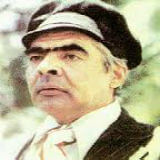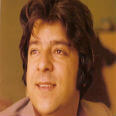
زندگینامه ساربان
ساربان از نخستین آواز خوانان آماتور افغان بود که صدای گیرا و آهنگهای روحپرورش هنوز آرامشگر روان شنونده است.
مرحوم عبدالرحیم محمودی " ساربان " در هفتم حمل سال ۱۳۰۸ هجری شمسی در یک خانواده ی پر افتخار و روشنفکر چشم به جهان گشود. تعلیمات ابتدایی را در مدرسه قاری عبدالله و متوسطه را در لیسه میخانیکی کابل به پایان رسانید. در سال۱۳۳۱ هجری شمسی وارد دنیای رنگین هنر گشت و نخستین فعالیت های هنری اش را که بازی در تیاتر و آوازخوانی بود تحت نظر استاد فرخ افندی آغاز نمود.
ساربان پس از مدت زمانی در می یابد که پیوندش بیشتر با موسیقی است و فعالیت اش را بیشتر در راستای موسیقی ادامه میدهد. به احتمال زیاد که نخستین آهنگ ساربان چنین بود:
تا بکی ای مه لقا در بــــدرم میکنی
از غمت ای دلربا خون جگرم میکنی
اجرای شعر «خورشید من کجایی، سرد است خانهٔ من» سرودهٔ ابوالقاسم لاهوتی باعث شهرت بیشتر او شد.
پس از مدت زمانی احساس میشد ساربان این قافله سالار موسیقی خیلی درونگرا و آرام شده است، شاید بـعد های تلخ زندگی روی روان لطیف هنرمند اثر گذار شده بود.
در سال۱۳۶۴ بیماری فلج دامنگیرش شد و همچو موریانه آرام آرام از پایش افگند و از فعالیت های هنری اش کاست.
در سال ۱۳۶۸ درد تلختری که مرهمی نداشت سراغش را گرفت. آری درد غربت بود..... که در گیریهای گروهی سبب ویرانی کابل شد، ساربان و خانوادههاش به پیشاور پاکستان مهاجرت کردند.
ساربان با این درد صدایی از گلویش بر نخاست که بگوید: " دیشب بخدا خمار بودم، سر گرم دو چشم یار بودم "و یا شاید در دل میگفت: " ثریا چاره ام کن " و گلهای شگوفای هنرش خشکیدن گرفت و پر پر شد. تا اینکه ساعت چهار در هفت حمل سال۱۳۷۳ هجری شمسی دست سیاه مرگ او را با خود برد و کاروان موسیقی افغانستان را بی ساربان و خاطر اهل قافله را در کوچه های تاریک غربت پشاور پاکستان پریشان ساخت.آرامگاه استاد هنردر قبرستان شهدای صالحین کابل است. البته ابتدا ایشان در شهر پشاور پاکستان دفن بودند که سالها پیش با همت مسوولین تلویزیون ملی افغانستان و شخص نجیب الله روشن پیکر ایشان به کابل انتقال یافت.
Sarban's Biography
Sarban was born in Saragy, an old area of Kabul to the prominent and highly respected Mahmoody family. His father was a well-educated, highly respected, and prosperous rice merchant. The Mahmoody's were a family of illustrious doctors and surgeons highly respected among the educated elite of Kabul. However, The Mahmoody family had been leading social agitation and political activism for decades. As a result, his family was continuously persecuted by the monarchy at first, and then by successive governments which came after the monarchy. This persecution resulted in a huge diminishment of the family's wealth to the point that by the time Sarban was in his teens, they were virtually penniless. The majority of the most prominent and successful family members (including Sarban's only two brothers, and almost all of his first cousins) had been either executed or exiled by the time Sarban had begun his musical career. These conditions profoundly influenced his choice of poetry and his music. For example, he chose the poem "Een Ghame Be Haya," for composition when his first cousin Latif Mahmoody had been arrested and executed.
Sarban was shy and reclusive throughout his life. He seemed indifferent to fame, celebrity, and wealth for his entire life, even when through the prime of his career, which began peaking in the 1960s. At the peak of his celebrity, he polarized the Afghan intellectual class between those who loved and referred him for his art and those who criticized him for his personal life.
Sarban gained popularity due to his music style, which was highly unconventional for its time, but it went on to become the gold standard of Afghan musical style. Sarban's popularity is mainly with the elite and educated classes in Afghanistan where appreciation of his music is considered the height of sophistication, learning, and elegance.
Sarban accepted the offer to work as an actor because, according to him, he had no prospects of employment and of feeding his young family. While acting in the theatre, Sarban was rediscovered by the composers Nainawaz and Taranasaz for his extraordinary and evocative baritone voice. Without any training in voice or singing, Sarban was offered the opportunity to become a singer. His first recorded song was "Man Akher Az Ghamat Ay Mahro," and "Tu Aftabi Wo Man." The songs, played in Kabul Radio, generated a great degree of interest and enthusiasm among the public in Sarban's voice.
He had an acute ear for musical sound and a broad and profound understanding of Persian poetry. Because of his lack of training and background in the predominant musical traditions in Afghanistan Sarban became the artist who has freed Afghan music from subservience to the Indian, Iranian, and folkloric musical traditions. In cooperation with composers Sarban managed to create a musical language that was unique to Afghanistan. Although his first few songs "Tu Aftabi wo man," and "Man akher az ghamat," were made strictly in the Indian classical model, his ensuing songs "Rahm kon ram kon," "Saqi dile ma," "ya maula dilam tang amada," "shod abro para para," and the hit songs, "az bas ke nazanini," "asare shikanje maujam," "Man nainawaz am," and "Harja ke safer karma," became models of a new sound that broke away from the traditional musical vocabulary in Afghanistan at the time.
his new sound was made immortal by the creation of a slew of songs in later years (such as Ahesta Bero, Ay Sarban, Dar Damane Sahra, Khorsheede Man, Ay Shakhe Gul, Moshke Taza Mebarad, Dosh Az Masjid, Deshab ba khoda, Nameporsi Naame man, Sobhe Keshaare Maiwar, Take nabashad ham dame jani, Ta ba kai ay mah liqa, Een ghame be haya mara, haal ke deewana shodam merawi, Aye shake gul) which defined Afghan music (especially the Persian musical genre) for decades to come.
Sarban's personal life constantly hindered his complete devotion to his musical career. Sarban could never fully commit himself to his art because of many family tragedies and difficulties that befell him persistently. He routinely fell into deep clinical depression due to the numerous concerns in his personal life such as the loss of his close relatives and family members including his brothers. Consequently, he took to heavy drinking to deal with his many personal problems. This took a heavy toll on his career, as he failed to produce any original music after the mid 1970s.
Sarban did fight with severe bouts of depression throughout his life. Many of his close relatives (including his younger brother) were arrested for their political activities and executed by the regime at the time, and many others were imprisoned or forced to flee in exile. This and the difficulties of raising a family without any reliable source of income were the main reasons for his depressive bouts. His close friends and family all dismiss this as urban legend. Sarban was indeed married to one of his cousins, and he has four children (three daughters and a son). His son Abdulrab Sarban recorded an album covering some of Sarban's famous songs. Due to the political turmoil in Afghanistan, he and his family emigrated to Pakistan where he died impoverished. After 12 years of his death, the Afghan Government made arrangements with his family to relocate his remains to Kabul.

